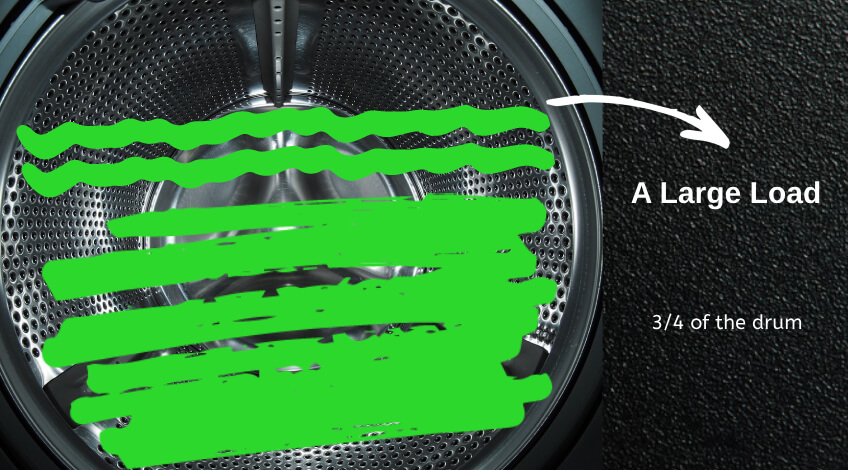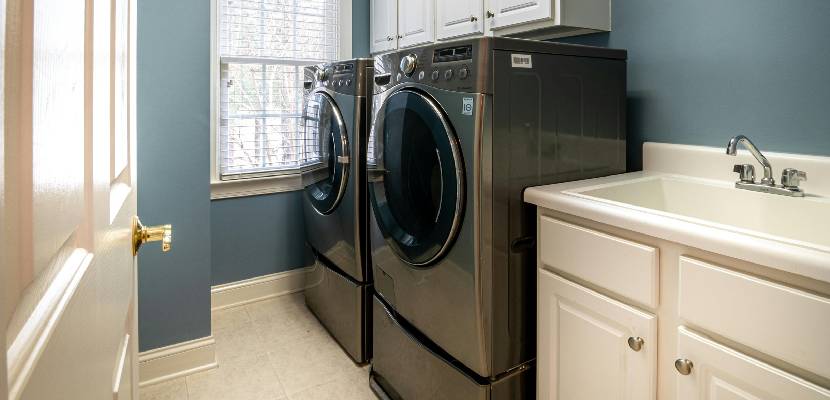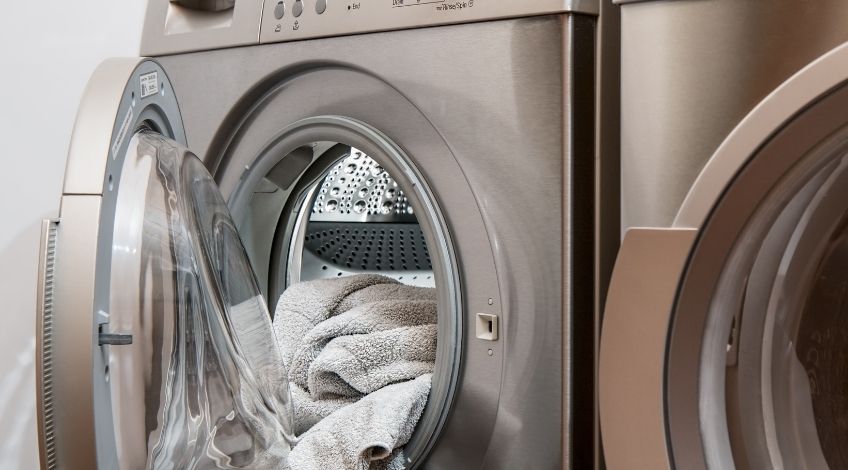
LG Washing Machine Making Noise When Spinning? Here’s why & what to do
LG washing machines have a good reputation in the appliance world and are well known for their value for money and reliability. Which makes it even more worrying when something goes wrong with your LG washer.
If your LG washing machine has started making an unusual or unexpected noise when spinning, keep reading. In this article we take a look at the reasons why your LG washing machine has started making noises whilst the drum is spinning.
Many of the reasons we have listed are relatively easy to fix and can be done without any DIY knowledge at all. Others might need the assistance of a washing machine technician to solve.
Why Is My LG Washing Machine Making A Noise When Spinning?
Let’s take a quick look at the most likely reasons for your LG washing machine to make excessive or unexpected noise whilst spinning.
| Probable Cause Of Noise | Type Of Noise | Remedy |
|---|---|---|
| Uneven Load | Banging, clanging, vibrating or thumping | Ensure the load is evenly redistributed |
| Washing machine unlevel | Rattling, banging, vibrating or grinding | Check the level and adjust the washer’s feet accordingly |
| Overloaded drum | Grinding or roaring | Remove some laundry, only ever fill the drum ¾ full |
| Foreign objects in the drum | Rattling, banging, whirring, grinding, roaring | Check the drum for any foreign objects and remove |
| Long water inlet hose or drainage hose | Vibrating, banging or knocking | Ensure the inlet and drainage hose are not touching the washer |
| Cupboards or cabinets too close | Knocking, banging | Move cabinets or washing machine further away |
| Blocked drain filter or tub | Whirring | Clean filter and tub and remove any obstructions |
| High water pressure | Squealing, whistling, banging, clanging | Reduce water pressure if above 100 psi |
| Defective drive belt | Squealing, squeaking, roaring | Replace the drive belt |
| Defective drive pulleys | Squealing, squeaking, roaring, banging | Replace the drive pulleys |
| Defective shock absorbers | Banging, clanging | Replace the shock absorbers |
| Defective drum bearings | Grinding, whining, roaring | Replace the drum bearings |
Let’s take a closer look at each of these issues.
Uneven Load
For the drum to spin correctly, the washing needs to be evenly loaded. If it’s not, it’s likely to spin incorrectly and make an unusual noise.
To fix this, check that the drum is loaded correctly and that there’s not an uneven distribution of weight in the drum. If there are too many items in the drum, you may have to remove some to level the load.
On the other hand, if there’s not enough laundry in the drum, you might need to add a few more items to help it achieve a balanced load.
Washing Machine Unlevel
If the washing machine isn’t level, it can cause the laundry to not sit evenly in the drum. This can make the drum wobble instead of spinning correctly.
Using a spirit level, check that your washing machine is level. You can adjust the level using the feet on the washer.
Overloaded Drum

All washing machine experts agree that you should never run a washer with an overloaded drum. This means never filling the drum to more than ¾ of its capacity.
You can weigh the laundry before washing to determine the correct amount for each drum size. Or you can just make sure not to fill the drum more than ¾ full ensuring there is a sufficient space at the top of the drum after the laundry has been added.
Foreign Objects In The Drum
Unfortunately this is more common than you’d think. We all lead such busy lives which means we often overlook some of the more fundamental tasks. Like checking every pocket on each item that’s put into the washer.
Foreign objects like;
- Keys
- Screws
- Nails
- Pins
- Coins
- Bra Wires
- And much more
Can all become stuck through the drum of the washer and scrape onto other parts. This can cause all manner of different noises including rattling, banging, roaring, whirring and grinding.
These noises can be quite worrying as they are very similar to the noises made when more serious issues occur.
Check the drum for any foreign objects and remember to always check the pockets of all items to avoid this happening again.
Long Hoses
Some washing machines come supplied with excessively long water inlet and/or drain hoses. This is great if your washer is positioned a long way from the drain or water supply. But can be problematic if the hose is too long.
During the spin cycle, the hose(s) could start to rub against the wall of the appliance. This could lead to the knocking, vibrating or banging sound coming from your washer.
To remedy this you’ll need to ensure there is enough clearance between the hose(s) and the washer.
Cabinets Too Close To The Washing Machine

If you have placed your washing machine too close to surrounding cabinets or cupboards, the noise created when the appliance is spinning could be due to the machine banging on the cabinets.
To solve this you’ll need to move either the washer or the cabinets so that neither are touching. Once there is ample space between the washer and the cabinets or cupboards, they shouldn’t collide which will eliminate the noise.
Blocked Drain Filter Or Tub
Over time, the tub can become clogged or blocked. This can lead to the washer producing a loud whining noise as the drum spins.
To solve this, inspect the tub and the filter for any blockages and remove them before fully cleaning the filter.
High Water Pressure
Washing machines need a minimum water pressure of at least 20 psi (pounds per square inch). However, if the water pressure is in excess of 100 psi, it could be too high for the appliance.
This can lead to a loud squealing or banging sound. You can check the water pressure using a water pressure gauge.
- Package includes: A dial instrument pressure gauge with double scale for bar/psi measurement
- Material: Stainless steel braid hose and corrosion-resistant pressure gauge, with rubber protector
Use the water pressure gauge to find out if the water pressure is indeed too high. You can adjust the water pressure by partially closing the water supply valve (stopcock).
Defective Drive Belt
The drive belt is connected to the drum and the motor on your LG washing machine. If the drive belt breaks, the drum will not turn at all when the washing machine is in operation.
However, if the drive belt is starting to break or fray, it’s likely to make a roaring or squeaking noise.
To resolve this you will need to inspect the drive belt and replace if needed. As this involves dismantling the washer, we recommend getting a technician to do this for you.
Defective Drive Pulleys
The drive pulleys on LG washing machines tend to be made from plastic or metal. They aid in the movement of the drive belt. If one of these drive pulleys becomes loose or damaged, it can lead to excessive or unusual noises.
To resolve this you will need to get the drive pulleys replaced and as this involves dismantling the washer, we recommend calling in a technician to do this for you.
Defective Shock Absorbers
The shock absorbers on your LG washing machine are likely to wear over time. They will not then absorb the extra movements of the drum as it spins.
If this is the case the washer will make an unusual noise when spinning. As this noise is very similar to the sound of an uneven load, unlevel washer and foreign objects in the drum, you should check and eliminate these as the cause of the noise first.
If it is the shock absorbers that are defective, you will need to replace them before reusing the appliance.
Defective Drum Bearings
If the drum bearings start to wear on your LG washing machine, you’ll most likely hear a grinding noise or a roaring, growling sound.
Getting to the drum bearings is difficult as it means dismantling the washer and splitting the outer drum. We recommend getting a technician to do this repair.
How to Troubleshoot A New LG Washing Machine That’s Noisy When Spinning

If you have a new LG washing machine and it’s making a noise while spinning, it’s most likely to be caused by one of the following;
- Uneven Load In The Drum
If the sound is a banging, thumping or vibrating sound it’s most likely caused by the laundry in the drum being uneven. You will need to redistribute the load to get the drum spinning correctly which should stop the noise. - Unlevel Machine
The most common cause of a banging, grinding or vibrating sound coming from your new LG washer when it’s spinning is if it’s not level. Check the level of the machine using a spirit level and adjust the feet as necessary. - Overloaded Drum
If you have crammed too much laundry into the drum it could be making a roaring or grinding noise. You should never fill the drum to more than ¾ full of laundry. - Something Stuck In The Drum
If the noise sounds like a banging, rattling or roaring sound it could be that something is rattling around in the drum. You should always check the pockets of all items before loading the drum. - Water Hose Or Drain Hose Too Long
If the drain hose or water inlet hose is exceptionally long, it could be bashing against the side of the washer when the machine is spinning. You will need to check and allow for a clear space between the washer and any hoses.
That’s about everything you need to know about this issue when it comes to front loaders, but what about top loaders? Well let’s take a look:
How to Troubleshoot A New LG Top Loader Washing Machine That’s Noisy When Spinning
Your new LG top loader washing machine could make a noise when spinning due to;
- An Overloaded Drum
If the drum is overloaded, the drum will make excessive noise as it spins. Never overload the washer to prevent damage and eliminate any excessive noise. - An Unbalanced Load
If the load is too much over one side of the drum, the washer could make excessive noise while spinning. Rearrange the laundry so that it is balanced. - An Uneven Floor
If the floor or the machine itself is uneven, it’s likely to cause it to make a noise when spinning. Always ensure the machine is level before using. - Loose Objects In The Tub
If the noise is like a scraping or rattling or even a roaring or grinding sound, it’s more than likely caused by stray objects like keys, coins etc in the drum. Always check the pockets on all items before loading them in the washer. - Washer Too Close To Cabinets
If the washer has been placed too close to a wall, a cabinet, a cupboard or shelving, it could be banging against these objects once the spin cycle starts. Ensure the appliance is away from any other object and is not touching anything that could create a noise. - Water Supply Hose Or Drain Hose Too Long
If the water supply hose or drainage hose are too long, they’re likely to bang against the washer as it spins. You will need to ensure that the hose(s) do not touch the washer when it’s in operation. - Worn Out Suspension Rods
Just like the shock absorbers on a front loader, the suspension rods on a top loader help to keep the drum balanced. This reduces vibrations, banging and friction. If they become worn, the washer can start to make loud noises when the tub is spinning. If the suspension rods are worn, they will need to be replaced.
SEE ALSO: LG Washing Machine Cycles Explained (front load & top load)
Frequently Asked Questions
There are several reasons why your LG washing machine could be making a loud noise while spinning, these include; an overloaded drum, an uneven washer, one of the hoses is banging against the appliance, there is something stuck in the drum, or an internal component has developed a fault.
It is normal for LG washers to make a humming noise when the machine is draining. However, if the noise is far louder than normal, it could be because there is a foreign object in the drain filter.
A bad washer bearing sounds like a grinding, rumbling or roaring sound. However, there are other reasons why your washer could be making these sounds including; a defective drive belt or an overloaded drum.





